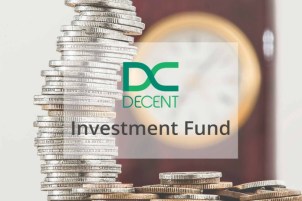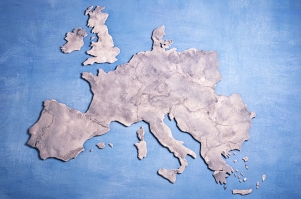 For years, the common wisdom about robots was that they’re taking over repetitive, routine jobs. But at least they’re not creative. We’ll always have art and music to ourselves, right? Wrong. Douglas Eck works at Google. He created the Magenta project, dedicated to using artificial intelligence, or AI, to make art and music. Eck is using a form of AI called Machine Learning. His software analyzed thousands of sketches done by people; and now, it knows how to complete a drawing itself.
For years, the common wisdom about robots was that they’re taking over repetitive, routine jobs. But at least they’re not creative. We’ll always have art and music to ourselves, right? Wrong. Douglas Eck works at Google. He created the Magenta project, dedicated to using artificial intelligence, or AI, to make art and music. Eck is using a form of AI called Machine Learning. His software analyzed thousands of sketches done by people; and now, it knows how to complete a drawing itself.
EU proposals could see news publishers paid by Google and Facebook
 News publishers would have stronger rights to demand payment from digital giants such as Google and Facebook in exchange for using their content, under proposed European rules that are designed to shore up the collapsing revenues of traditional media companies.
News publishers would have stronger rights to demand payment from digital giants such as Google and Facebook in exchange for using their content, under proposed European rules that are designed to shore up the collapsing revenues of traditional media companies.
The measures are part of a series of reforms that the European commission plans to put out to consultation in September. They are designed to strengthen the rights of those who create and invest in original content, from authors and musicians to record labels, broadcasters and publishers.
Source: EU proposals could see news publishers paid by Google and Facebook | Technology | The Guardian
An ethical Google won’t break the internet, leaked EU report finds
 Making Google a good corporate citizen and pay creators fairly won’t break the internet, a leaked impact study on copyright suggests. The 200 page impact assessment (IA), leaked to Statewatch, addresses the thorny issue of content sharing platforms such as Facebook, YouTube and Twitter.
Making Google a good corporate citizen and pay creators fairly won’t break the internet, a leaked impact study on copyright suggests. The 200 page impact assessment (IA), leaked to Statewatch, addresses the thorny issue of content sharing platforms such as Facebook, YouTube and Twitter.
“Some online service providers refuse to negotiate any agreement, which means that despite the availability of copyright protected content on these platforms no revenues are generated for right holders for the use of their content. Refusals of agreements have above all been reported by right holders in the music and images sectors. At the same time, some online service providers have argued that right holders have requested terms that they considered unreasonable for the type of service they provide,” it notes.
It urges the platforms to be more positive about using filters to weed out infringing UGC.
Source: An ethical Google won’t break the internet, leaked EU report finds • The Register
Decent.ch Blockchain Network Qualifies For Massive Adsense Support In Non-Profit Deal with Google
 Decent.ch has announced they have met the criteria and qualified for Google Ad Grants which will allow them a whopping and free 10,000 dollars a month in Google Adsense.
Decent.ch has announced they have met the criteria and qualified for Google Ad Grants which will allow them a whopping and free 10,000 dollars a month in Google Adsense.
The program is meant to help Nonprofit organizations to become visible, engage the right audience, get more volunteers or donations. Simply said, Google Ad Grants help valuable ideas to become a reality in a today’s fast-moving world.
Google Partners With LyricFind To Deliver More Lyrics In Search, Administer Rights
 Google Search and Google Play Music are diving more deeply into song lyrics via a deal with LyricFind. Lyrics as an add-on have been getting attention lately. Apple Music is adding them. Spotify offered lyrics and recently dropped them, but insists their coming back.
Google Search and Google Play Music are diving more deeply into song lyrics via a deal with LyricFind. Lyrics as an add-on have been getting attention lately. Apple Music is adding them. Spotify offered lyrics and recently dropped them, but insists their coming back.
Google has partnered with LyricFind to expand its lyric offerings. Adding lyrics from over 4,000 publishers to Google’s search results and within Google Play Music, LyricFind now provides licensing for lyrics displayed in Google’s search results as well as in the music app.
Source: Google Partners With LyricFind To Deliver More Lyrics In Search, Administer Rights – hypebot
Google’s computers are creating songs. Making music may never be the same.
 Google has launched a project to use artificial intelligence to create compelling art and music, offering a reminder of how technology is rapidly changing what it means to be a musician, and what makes us distinctly human.
Google has launched a project to use artificial intelligence to create compelling art and music, offering a reminder of how technology is rapidly changing what it means to be a musician, and what makes us distinctly human.
Google’s Project Magenta, announced Wednesday, aims to push the state of the art in machine intelligence that’s used to generate music and art.
Source: Google’s computers are creating songs. Making music may never be the same. – The Washington Post
Google wanted to buy Michael Jackson’s $750m stake in Sony/ATV
 For many in the music business, the repercussions of Google being allowed to get near a 50% stake Sony/ATV would be deeply worrying. Sony/ATV manages 4m music copyrights written by the likes of The Beatles, Taylor Swift, Michael Jackson, Ed Sheeran, James Brown, Elvis Presley, Lauryn Hill, Oasis and Eminem.
For many in the music business, the repercussions of Google being allowed to get near a 50% stake Sony/ATV would be deeply worrying. Sony/ATV manages 4m music copyrights written by the likes of The Beatles, Taylor Swift, Michael Jackson, Ed Sheeran, James Brown, Elvis Presley, Lauryn Hill, Oasis and Eminem.
Remember that those 4m copyrights are spread through countless recordings and, therefore, master rights deals with labels. That would have been the first headache for the likes of Universal Music Group.
Source: Google wanted to buy Michael Jackson’s $750m stake in Sony/ATV – Music Business Worldwide
Pan-European Licensing Hub ICE Strikes Deal With Google Play
Desi gned to enable faster, more cost efficient and simplified rights negotiations for digital music services operating in Europe, the licensing and royalty processing service collectively represents over 250,000 songwriters.
gned to enable faster, more cost efficient and simplified rights negotiations for digital music services operating in Europe, the licensing and royalty processing service collectively represents over 250,000 songwriters.
The organization bills itself as the world’s first integrated licensing and processing hub and claims to have the most comprehensive copyright database in Europe. It says it will process online music usage through a single matching engine that will eliminate “unnecessary processing” and significantly reduce disputed claims.
Source: Pan-European Licensing Hub ICE Strikes Deal With Google Play | Billboard
Hail and Farewell to The Google Books Case
 When the Authors Guild and a group of publishers first sued Google in 2005, the ink was barely dry on the earliest holdings that search engine indexing was a fair use, and the legality of creating search engines for copyrighted content was still subject to serious dispute. Those fears have subsided.
When the Authors Guild and a group of publishers first sued Google in 2005, the ink was barely dry on the earliest holdings that search engine indexing was a fair use, and the legality of creating search engines for copyrighted content was still subject to serious dispute. Those fears have subsided.
Judge Pierre Leval’s magisterial opinion in the Google case is an authoritative restatement of modern fair use, but it breaks no new ground. After a decade of legal decisions, the proposition that search engines are fair use is so well established as to be boring. While there are still interesting cases at the margins (what counts as a search engine? And when does a search engine go too far?) technologists today have secured their landing zone.
PRS and Google Announce a ‘Shazam for Music Licensing’
 UK-based performing rights society PRS for Music is purportedly working with Google to help report performance fees for music played in public more accurately.
UK-based performing rights society PRS for Music is purportedly working with Google to help report performance fees for music played in public more accurately.
Performance fees are paid to artists and publishers of copyrighted songs wherever they are played in public, whether that be on television, broadcast over radio, played over the stereo in retail establishments, or in venues like sports arenas and concert halls.
The traditional methods for determining these fees rely on radio logs, cue sheets created by television and film companies, or sample surveys, which randomly track songs for several hours in bars, clubs, and venues. When devised, these techniques were as accurate as technology allowed. Developments in the decades since, however, could greatly improve precision — and boost the payouts to artists.
Source: Dancing Astronaut
